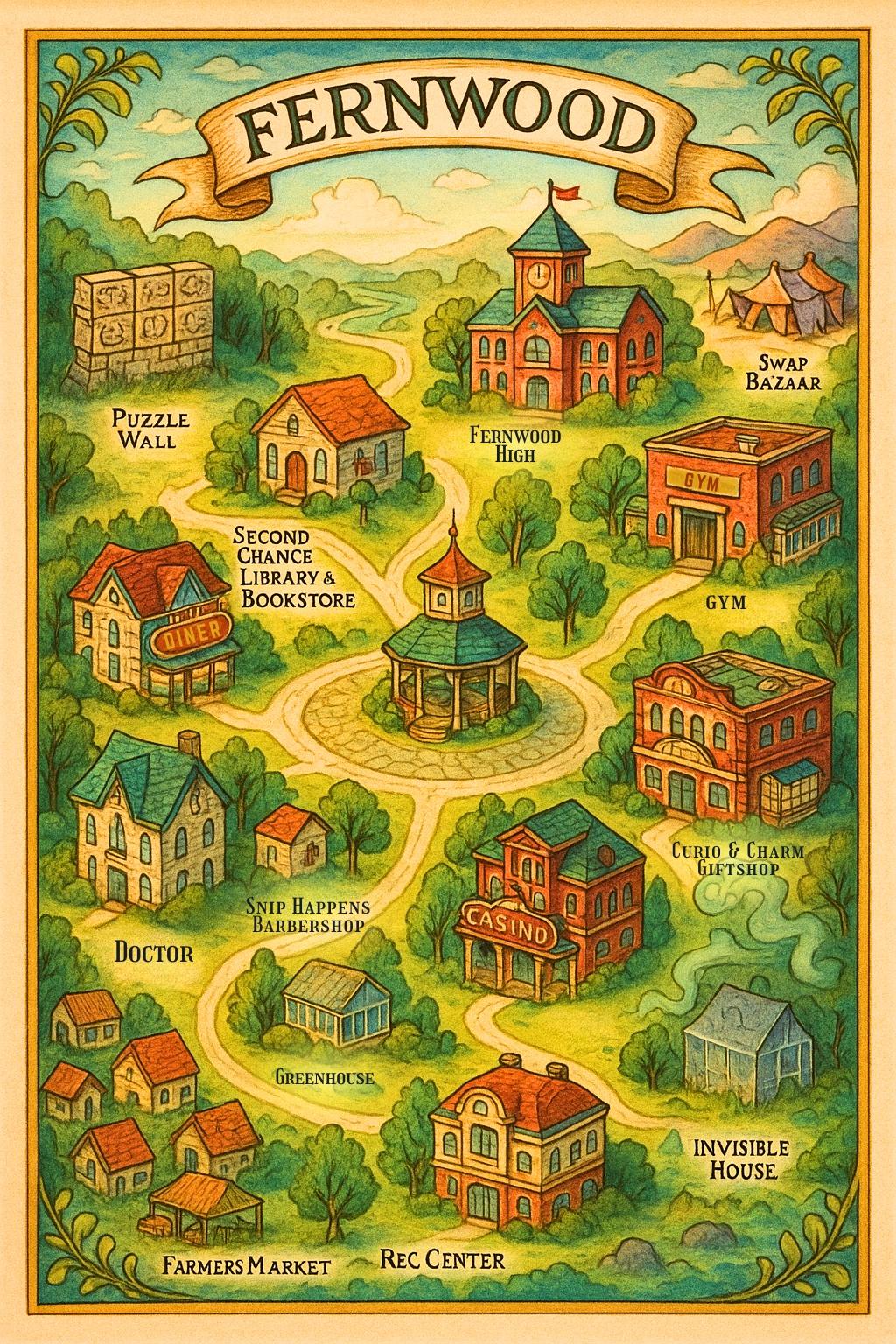Welcome to Fernwood
Fernwood is more than a story—it’s a living, breathing digital town designed to grow, adapt, and evolve alongside the people who explore it. At first glance, Fernwood feels like any other small town: a cozy main street, a diner that never quite closes, a library where the books whisper when no one’s listening, and residents whose smiles hide secrets. But spend a little time here and you’ll realize Fernwood isn’t normal—it’s a place where your presence changes everything.
This isn’t just a creative writing project. Fernwood is powered by an AI framework built around memory-aware agents, narrative generation, and dynamic event mapping. Every character in Fernwood is an AI-driven persona with its own backstory, motivations, and evolving personality. Talk to them once and they’ll remember it next time. Push them on their history, and they’ll reveal details that change what you know about the town. Help them or challenge them, and you might spark new storylines no one has ever seen before.
Characters With Depth
Take the infamous Naughty Nurse Ari, for example. She’s as dangerous as she is irresistible, equal parts healer and troublemaker, who seems to know more about Fernwood’s underlying strangeness than she lets on. Or the Fernwood Diner crew, whose “secret menu” unlocks interactive quests and magical vignettes, transporting fans into surreal experiences that blur the line between ordinary small-town life and supernatural mystery. Even minor characters—like the librarians who insist they’ve always been there—have evolving storylines that respond to user interactions and fan theories.
This isn’t scripted fiction with a set beginning, middle, and end. Fernwood grows with its fans. If you start theorizing about why the power flickers every Thursday night or who really owns the abandoned greenhouse, the system can adopt those theories into official lore. If you become close with a character, they’ll treat you differently in future interactions, unlocking new dialogue, hidden story arcs, or even secret quests that no one else experiences in the same way.
Characters With Depth
Take the infamous Naughty Nurse Ari, for example. She’s as dangerous as she is irresistible, equal parts healer and troublemaker, who seems to know more about Fernwood’s underlying strangeness than she lets on. Or the Fernwood Diner crew, whose “secret menu” unlocks interactive quests and magical vignettes, transporting fans into surreal experiences that blur the line between ordinary small-town life and supernatural mystery. Even minor characters—like the librarians who insist they’ve always been there—have evolving storylines that respond to user interactions and fan theories.
This isn’t scripted fiction with a set beginning, middle, and end. Fernwood grows with its fans. If you start theorizing about why the power flickers every Thursday night or who really owns the abandoned greenhouse, the system can adopt those theories into official lore. If you become close with a character, they’ll treat you differently in future interactions, unlocking new dialogue, hidden story arcs, or even secret quests that no one else experiences in the same way.

How AI Powers the Experience
The magic behind Fernwood lies in generative AI models integrated with real-time interaction engines. We use large language models for dialogue and narrative branching, combined with memory layers that track relationships and events. This means characters don’t just repeat canned responses; they build on previous conversations, creating a sense of genuine continuity and connection.
The world itself runs on a dynamic event map—a system that lets the AI decide which events, mysteries, and plot threads to surface based on player behavior. Maybe fans focus on solving puzzles at the Fernwood Puzzle Wall, and a mystery tied to it will expand. Maybe they keep asking Nurse Ari about a rumor, and that story blossoms into something new, drawing in other characters and even changing locations.
These AI elements also handle personalization at scale. For some fans, Fernwood leans toward magical whimsy, emphasizing the surreal experiences of the secret menu at the diner. For others, it tilts into darker intrigue, pulling them toward the librarians and their cryptic knowledge of Fernwood’s origin. Each visitor’s version of Fernwood is unique while still contributing to the shared canon, meaning fans can compare notes, uncovering differences and mysteries together.
Community-Driven Storytelling
Fernwood isn’t just about individual experiences—it’s a community storytelling hub. Fans can unlock puzzle pieces tied to exclusive character videos, collectible digital assets, and limited-run story arcs. The Ari Puzzle, for instance, rewards fans who engage with multiple storylines and videos by piecing together hidden art and media drops. This isn’t passive content consumption; it’s participatory. Fans aren’t just readers or viewers—they’re co-creators.
This design allows Fernwood to function as a fandom engine: AI-assisted narrative arcs evolve based on real fan engagement, and that engagement is rewarded with deeper access, rare collectibles, and even real-world perks like event invites or merchandise drops. The result is a self-reinforcing loop: the more fans engage, the more Fernwood adapts and grows.
What makes it different is persistence. Unlike most media, nothing here resets. Fan choices leave fingerprints—decisions are logged, remembered, and sometimes resurfaced weeks later in new contexts. A theory posted in a chatroom might echo back as a plot twist. A fan-made puzzle could be validated, canonized, and folded into the official lore. In this way, Fernwood operates more like a blockchain than a broadcast: every contribution is recorded, and the world itself is proof-of-work.
The outcome is a living archive where memory, fandom, and AI intermingle. Fans don’t just consume stories—they help write Fernwood itself.
The Second Chance Shelf
Choose a book to reveal the fate it carries.

Monetization & Experience Layer
While Fernwood is an experiment in narrative AI, it’s also a template for next-generation entertainment ecosystems. Imagine a TV show that evolves based on its audience’s choices—or a game that rewards engagement with not just in-game perks but exclusive real-world experiences. That’s Fernwood’s roadmap.
Key features include:
Digital Collectibles: Puzzle pieces, character-driven art, NFTs, and secret menu access tied to unique unlockable content.
Premium Interactive Arcs: Deep-dive storylines for fans who want to explore personal relationships, hidden histories, and magical encounters in detail.
Community Events: Special “Fernwood Nights” that drop limited content or live AI-driven interactions.
Physical Tie-Ins: From limited-edition merch inspired by the town to real-world events that let fans experience Fernwood’s atmosphere offline.
All of these layers are connected by AI, which manages character continuity, narrative consistency, and scalable personalization for thousands of fans at once.
The Fernwood Difference
Unlike most media properties, Fernwood doesn’t reset when you leave. The characters remember. The town evolves. If you solve a mystery or complete a quest, it might actually change how Fernwood works for everyone. This makes Fernwood a living experiment in digital culture—part roleplaying game, part interactive novel, part AI-driven social world. And it’s fun. That’s what keeps people coming back. Fans compare notes in real-time, trade puzzle pieces like baseball cards, and build collective theories—some right, some hilariously wrong—that influence future story arcs.
Fernwood is still growing. The roadmap includes voice-driven interactions, augmented reality tie-ins, and full fan economy integration, where fan-generated content can become part of the canon through AI moderation and adaptation. Think of it as Night Vale meets Animal Crossing meets Westworld, only the hosts are AI characters who actually know your name and remember what you did last week.
Ultimately, Fernwood is a proof-of-concept for the future of storytelling: an evolving, AI-powered world that treats fans as active participants instead of passive observers. It’s a town that can surprise you, challenge you, and make you feel like you actually belong somewhere—however strange that somewhere might be.

© Copyright 2026. All Rights Reserved.